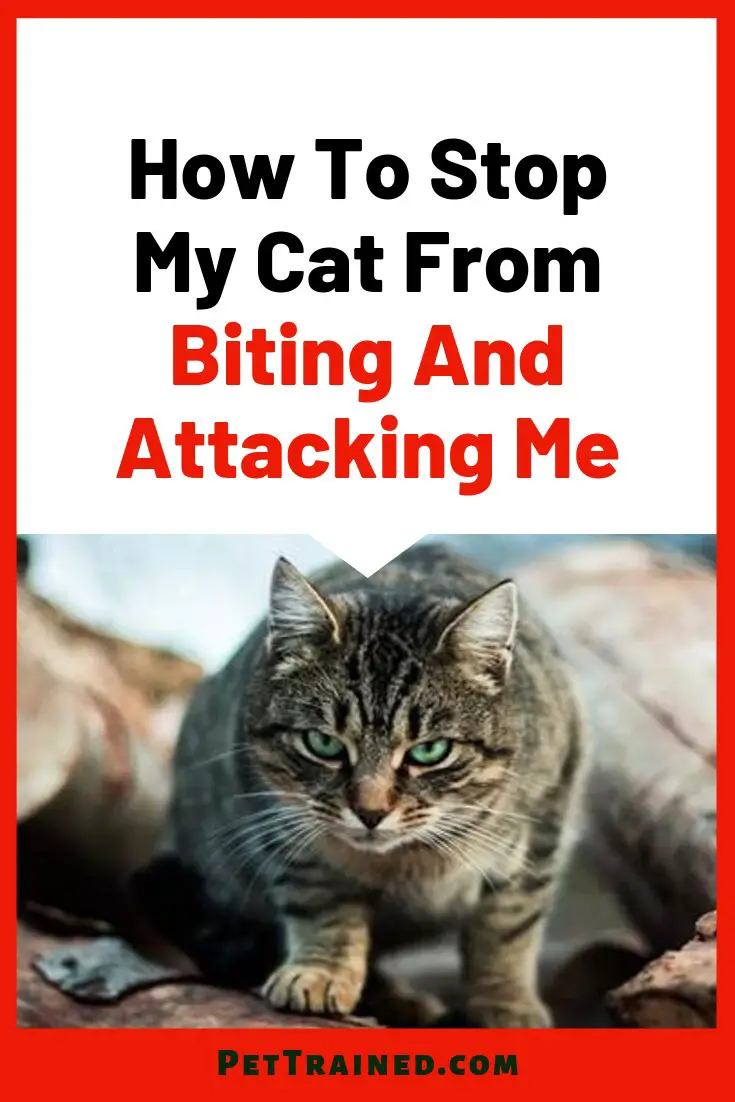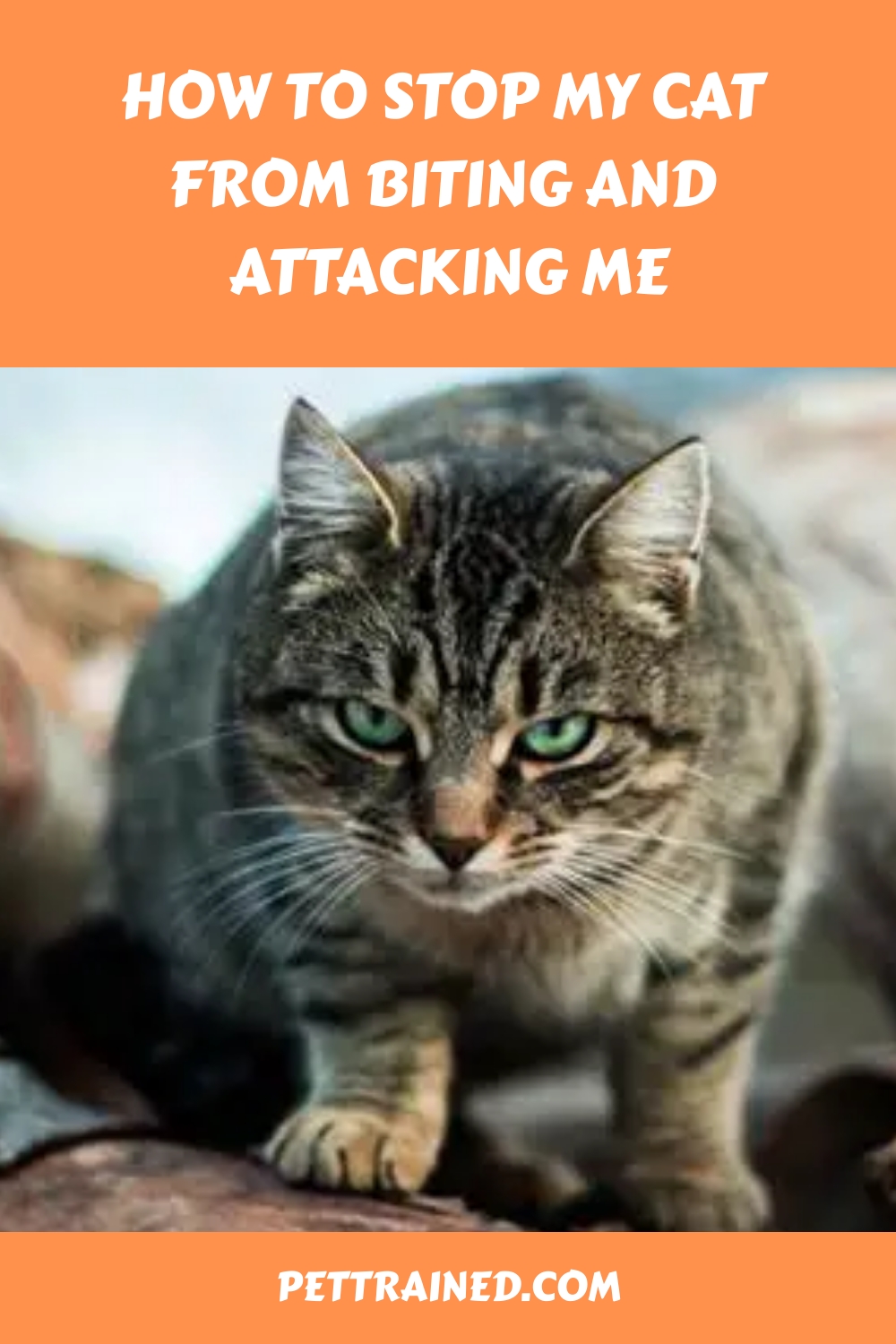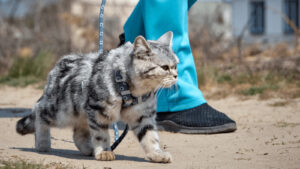Cats are the second most popular pets in the US. It is therefore not surprising that many cat owners like you face various problems with their cats.
Table of Contents
Tips On Stopping A Cat From Biting And Attacking You

If you own a cat, and your cat keeps attacking you frequently for no reason, you will need to find a solution quickly as this can be very dangerous to health.
As you will be finding out in this post, there are different ways of curbing this bad behavior.
Indeed, sometimes cats act strange, one minute they are acting friendly and the next they become aggressive and begin biting.
This behavior can be caused by various reasons and finding out the cause is as important as figuring out how to stop it.
This post contains affiliate links. However all the information provided on this site are my own honest opinions. See more in Disclaimer.
Reasons Why Your Cat Bites And Attacks You
Have you wondered why is your cat is attacking you?
There are many possible reasons and some of them include:
To show dominance
Cats like to show dominance. Due to the nature of cats, sometimes they want you to know that they are the ones in charge.
This is common if your cat is a big one and growling, biting and hitting are some of the behaviors they exhibit to show dominance.
To communicate
Since your pet cannot talk to you, biting you might be its way of trying to communicate with you.
The bites might get more serious if you fail to understand what it is trying to tell you.
Boredom
Boredom in cats is common especially when they are left on their own frequently with nothing to play with.
If your pet lacks toys to play with, it may become bored and decide to bite and attack you as a form of play.
Anger
Ideally, your cat should be happy when it sees you but this does not happen all the time.
It is possible for your cat to get angry with you if you do something it does not really like and it can result in this bad behavior.
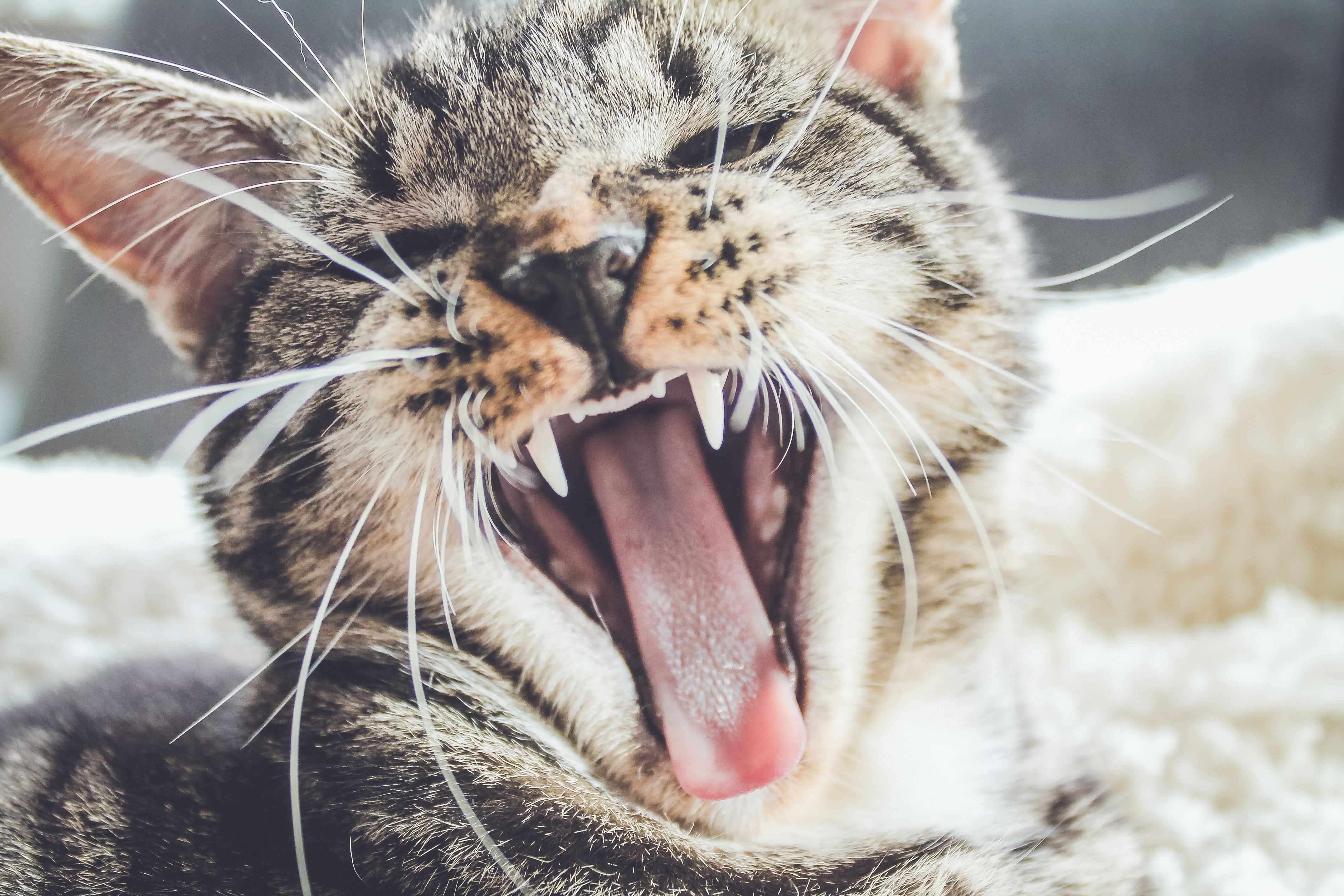
Hunger
This happens more in small cats and mainly in the morning time.
If your cat wakes up in the morning and comes to bite you, hunger could simply be the cause of the problem.
In this situation, the bites are usually not hard but just done to get your attention. However, it can still be hard if your cat is in an aggressive mood.
Fear
Fear is known to be the major cause of aggressive behavior in cats.
This fear reaction could be caused by different things such as loud noises, people shouting or speaking in unusually loud tones.
This can make a cat afraid and in such situations, cause your cat to turn aggressive as a means of protecting itself.
Redirected aggression
This is a situation whereby your cat is aggressively agitated at something (it could be a person or a fellow animal) it cannot reach.
In such a scenario, it turns to whoever is nearby and unleashes its aggression on them. This is quite common among cats and it can happen at any time.
Maternal aggression
This refers specifically to female cats.
In this situation, they turn aggressive as a bid to protect their kittens if they sense they are not safe.
This is a common form of aggression when a cat has just had kittens and will stop when the kittens grow older.

Territorial aggression
This applies mostly to male cats and is less likely among the female ones.
If your male cat senses that their territory has been invaded by you, they may attack you.
Mental disorder
According to thesprucepets, cats can experience mental disorders that affect their normal behavior.
This can make them forget things. It is even possible for them to forget who their owner is.
If your cat all of a sudden starts to bite and attack you constantly, (an action it has not been doing in the past), it could have a mental disorder.
Other medical conditions
A few other medical conditions can make your friendly cat aggressive and they include:
- Toxoplasmosis; This is a disease your cat can get if it eats infected prey. It is known to affect the brain and also behavior in animals.
- Rabies; rabies is common and in cats, change in behavior is one of the major signs of this illness. Your cat might become aggressive and restless if it is suffering from this condition.
- Hyperthyroidism; Just like rabies, aggression is a major symptom of hyperthyroidism in cats once they get this condition.
In order to be able to stop your cat from biting and attacking you, you should first use the list we have just explained, to try to figure out the reason for the behavior.
Things you can do to stop your cat from biting and attacking you
Moving on, here are some effective measures you can take to stop your cats biting and attacking behavior:
Obedience training
Training your cat from an early age is important if you want it to be a well behaved one.
Obedience training teaches your pet to understand, listen and follow your instructions. With this training, you can be able to caution your cat when it is biting and it will obey you.
Seek advice
Seeking advice from others just like you are doing here, can be a great help in dealing with your pets’ unfriendly behavior.
You can ask friends or families who might have been in such a situation before to tell you how they got over it.
In addition, you can visit online forums to read the success stories of others. This is quite beneficial as you learn from the mistakes of others.
Play with your cat
You should spend several minutes daily playing with your cat especially when you notice that it is in a very playful mode.
Doing this will help your pet become more friendly to you and stop (or at least reduce) the aggression and attacks you don’t like.
Each play session should last at least 10 minutes.
Feed it properly and on time
Not feeding your cat properly has a lot of disadvantages and making it unhappy is one of them.
When your cat is unhappy with you, attacking you seems likely. Cats are expected to eat at least two times a day; you should keep up with that.
Keep it busy
Keeping your cat busy is an ideal way to distract it and when its attention is away from you, it would neither bite nor attack you.
You can purchase different toys for it to play with or just leave it with any item that will stimulate its interest. Additionally, allowing it to self-feed using automated food dispensers or treat dispensers can also keep it busy.
Avoid stressing your cat
Aggressive cats should not be put into stressful situations, it is very important to avoid them.
If you are performing any activity involving your pet or you take your pet outdoors, look out for stress signs and if you notice any, withdraw your pet immediately and return home.
When your pet is less stressed, it will be more relaxed and less aggressive.
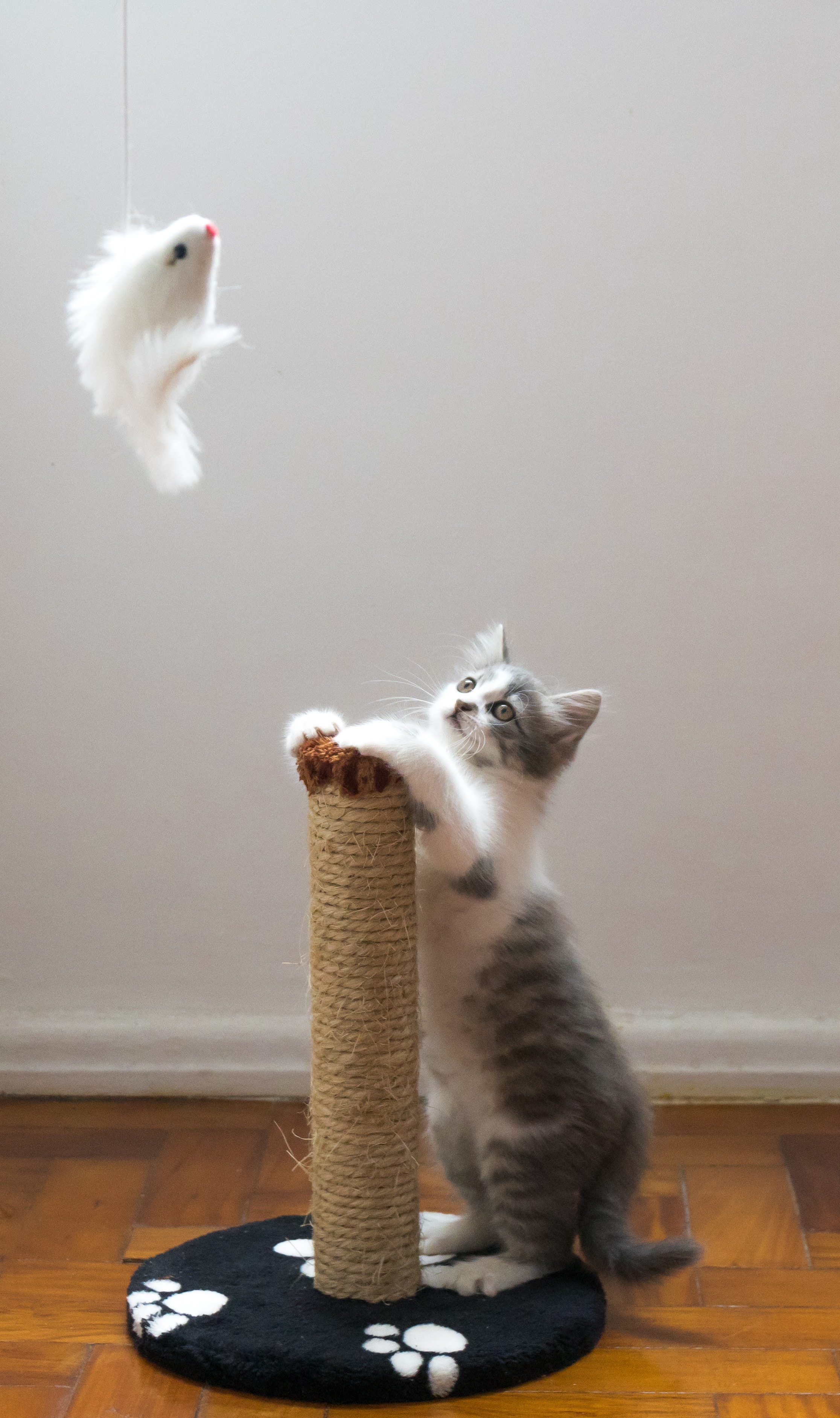
Use repellent devices
There are devices you can purchase to deter your cat from attacking you and there are many good options you can get.
Simply set up these devices in areas where your pet likes to attack the most and it will avoid such areas.
You should remove these devices if your pet does not seem to be scared of them so as not to injure it.
Use taste deterrents
These mostly come in the form of a spray that you can use on your body to deter your cat from biting you. They majorly contain bitter flavors that are not pleasant to cats.
If you use these taste deterrents, your pet will not enjoy biting you and will stop doing that.
Use a muzzle
Muzzles are items made to prevent cats from biting and chewing, they are made for aggressive cats.
They go over your cats’ mouth so they can’t open their mouth to bite. This is a short term solution like when there are visitors around or you need to take your cat somewhere.
There are many of these products available and you can easily order one from Amazon.
Offer rewards
When your cat exhibits positive behavior, you should reward it with something like a treat. That way, it will try to repeat the action to get more treats. When it learns that biting does not get it treats, it will stop doing it.

Reduce punishment
If you frequently punish your cat, it might become afraid of you and attack you when you come close to it.
According to Erin Ollila, cats do not learn by punishment, it is unlikely to understand what it is being punished for.
This does not mean you should not punish it but, keep the punishment light.
Shout less
Pets do not like it when people shout at them especially their owners who they are very fond of.
If you shout too much at your cat or any other person around your cat, it might develop fear and attack you when you reach out to it.
Learn cat body language
To understand your pet better, you need to learn the cat’s body language.
This will help you to know when it is happy or not and when it shows signs of aggressiveness.
Finally, It also helps you communicate better with your cat and create a strong bond between you both.
Record attacks
If you keep a record of when and where your cat attacks you, you might figure out what triggers it to do so and try to eliminate it.
Additionally, It can also help you protect yourself as you will know when to anticipate its attacks and be ready with a means of distracting it.
Neutering:
Neutering or spaying your cat might not be what you would want to do but some vets recommend it if your pet is a very aggressive one.
This applies more to male cats than the female ones and what it does is to lower their testosterone levels which will change their aggressive behavior.
See a vet
Seeing a vet is always recommended when dealing with any pet issue as they are more skilled in handling these animals.
Your vet can help figure out why your cat is biting and attacking you especially when the cause is health-related.
What to do if you were bitten by your cat
Cats bite are to be taken very seriously as they are very harmful to the human body.
Cats have large amounts of bacteria in their mouth and when they bite you, these bacteria can spread to other parts of your body.
If you were bitten by your cat, you should ensure that you disinfect and take care of it properly to avoid it causing other infections.
Here are some quick things you can do:
- Wash the wound: carefully and gently wash the area where you were bitten with antibacterial soap and water. This will help remove any form of bacteria at the surface of the wound.
- Stop bleeding: if blood is oozing out of the wound, you should stop bleeding by applying pressure to the injured area. This can be done using a clean towel.
- Apply bandage: if you have a sterile bandage with you, apply it over the wound so it is unexposed.
- Keep the wound raised: if you were bitten on your hands or leg, try to keep it raised for a few hours after the bite. This will help prevent the area from swelling and also prevent possible infections from spreading.
https://www.youtube.com/watch?v=XqrOI-5Fk2I
It is still recommended that you see a doctor especially if the bite is a very deep one to get proper treatment.
To reduce the risk of other infections, you will be given some antibiotics to take as treatment. In some cases, there might need to stitch up your wound for fast healing.
Conclusion
Cats are lovely animals but sometimes, they can become a pain due to their changes in mood and behavior.
Today we have been able to cover the following subject.
How To Stop My Cat From Biting And Attacking Me
We have looked at several causes and solutions to this problem
If your cat starts exhibiting bad behaviors like those discussed here, there are several things you can do to correct it.
The first thing you will need to learn about stopping your cat from biting and attacking you is to find out the reason for the behavior. Your vet can help you with these identifying possible reasons if you cannot handle it on your own. Even if you can, it is advisable to still at least seek advice from your vet.
If you have already been bitten by your cat, getting first aid treatment quickly is very important to do.
As explained in the article, a cats bite can cause several infections that pose a great threat to your health. You can try the suggestions listed above to provide a form of immediate first aid for yourself. However, if it is a very serious bite, you should see your doctor as soon as possible.
If you have learned something useful from this article, see this article about cat facts all cat owners should know.
Don’t forget to share this with others.
